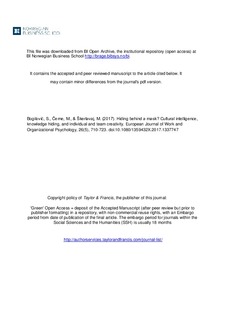| dc.contributor.author | Bogilovic, Sabina | |
| dc.contributor.author | Černe, Matej | |
| dc.contributor.author | Škerlavaj, Miha | |
| dc.date.accessioned | 2017-10-17T12:04:22Z | |
| dc.date.available | 2017-10-17T12:04:22Z | |
| dc.date.created | 2017-08-28T17:16:37Z | |
| dc.date.issued | 2017 | |
| dc.identifier.citation | European Journal of Work and Organizational Psychology. 2017, 26 (5), 710-723. | nb_NO |
| dc.identifier.issn | 1359-432X | |
| dc.identifier.uri | http://hdl.handle.net/11250/2460575 | |
| dc.description.abstract | Culturally diverse colleagues can be valuable sources for stimulating creativity at work, yet only if they decide to share their knowledge. Drawing on the social exchange theory, we propose that cross-cultural interactions among individuals from different national backgrounds can act as a salient contingency in the relationship between knowledge hiding and creativity (individual and team). We further suggest, based on the social ategorization theory (e.g., the categorization process of “us” against “them” based on national differences), that cultural intelligence enhances the likelihood of high-quality social exchanges between culturally diverse individuals and, therefore, remedies the otherwise negative relationship between individual knowledge hiding and individual creativity. Two studies using field and experimental data offer consistent support for this argument. First, a field study of 621 employees nested among 70 teams revealed that individual knowledge hiding is negatively related to individual creativity and that cultural intelligence moderates the relationship between knowledge hiding and creativity at an individual level. A quasi-experimental study of 104 international students nested in 24 teams replicated and extended these findings by implying that individual knowledge hiding is also negatively related to team creativity. We discuss the implications for practice and future research. | nb_NO |
| dc.language.iso | eng | nb_NO |
| dc.publisher | Taylor & Francis | nb_NO |
| dc.title | Hiding behind a mask? Cultural intelligence, knowledge hiding, and individual and team creativity | nb_NO |
| dc.type | Journal article | nb_NO |
| dc.type | Peer reviewed | nb_NO |
| dc.description.version | acceptedVersion | nb_NO |
| dc.rights.holder | Copyright policy of Taylor & Francis, the publisher of this journal: 'Green' Open Access = deposit of the Accepted Manuscript (after peer review but prior to publisher formatting) in a repository, with non-commercial reuse rights, with an Embargo period from date of publication of the final article. The embargo period for journals: http://authorservices.taylorandfrancis.com/journal-list/ | nb_NO |
| dc.source.pagenumber | 710-723 | nb_NO |
| dc.source.volume | 26 | nb_NO |
| dc.source.journal | European Journal of Work and Organizational Psychology | nb_NO |
| dc.source.issue | 5 | nb_NO |
| dc.identifier.doi | https://doi.org/10.1080/1359432X.2017.1337747 | |
| dc.identifier.cristin | 1489168 | |
| dc.description.localcode | 1, forfatterversjon | nb_NO |
| cristin.unitcode | 158,4,0,0 | |
| cristin.unitname | Institutt for ledelse og organisasjon | |
| cristin.ispublished | true | |
| cristin.fulltext | postprint | |
| cristin.qualitycode | 1 | |
